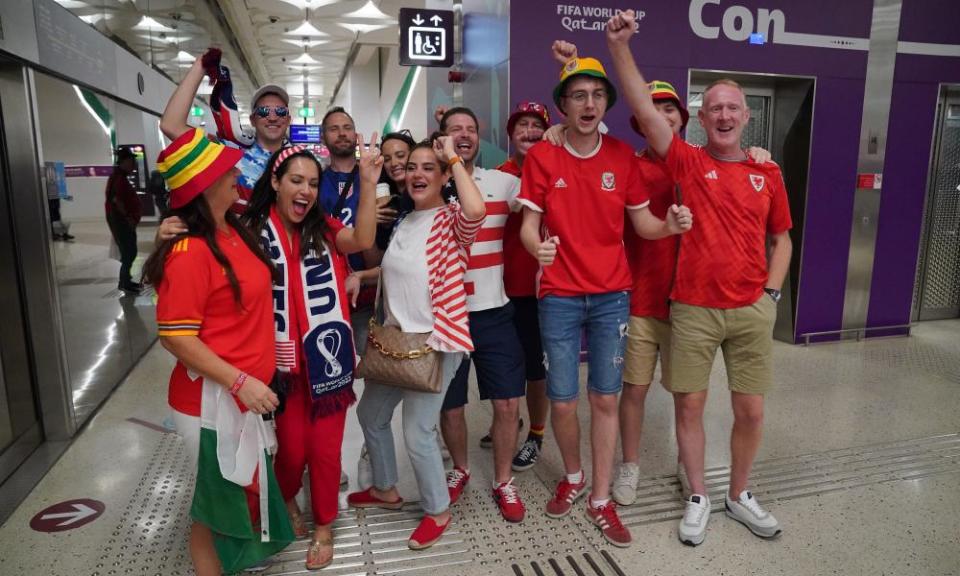Wales fans feel pride and despair but not anger after swift World Cup exit

It felt a little like a bride walking down the aisle on her special day, only for her dearly beloved to be staring at the reams of toilet paper that were stuck to her shoes. After all the hype and expectation, it wasn’t meant to be like this. A must-win game against our next door neighbours, to stand any chance of progression in our first World Cup for 64 years. Wales 0 England 3. Is this the way the future’s meant to feel?
Unlike the writers in some other newspapers, I am able to experience two emotions at once, with neither being anger. Enormous pride that we qualified. Incredible disappointment that we are going home. But it is disappointment with context. It is far better to get knocked out of a World Cup than not to get to one in the first place. What was so frustrating about the great qualification failures of my time as a supporter – Euro 92, USA 94, Euro 2004 and Russia 2018 – was the feeling of unfinished business, a cosmic unfairness that prevented footballers who were good enough to play on the biggest stage from doing so.
On the BBC Gary Lineker asked Ian Rush what the younger members of the Wales squad will have learned from Qatar. After talking briefly about the atmosphere, Rush said: “I don’t know, I never played at a World Cup.” Rush scored 346 career goals for Liverpool, won the European Cup and European Golden Boot, and yet failed at the final hurdle for his country. Tuesday night has to be better than that.
This is a World Cup like no other. For the last 12 years the Guardian has been reporting on the issues surrounding Qatar 2022, from corruption and human rights abuses to the treatment of migrant workers and discriminatory laws. The best of our journalism is gathered on our dedicated Qatar: Beyond the Football home page for those who want to go deeper into the issues beyond the pitch.
Guardian reporting goes far beyond what happens on the pitch. Support our investigative journalism today.
For a team that have taken the supporters to such uncharted territory – qualification for three of the past four tournaments, a Euros semi-final and a World Cup playoff win – there is the foreboding sense of an era coming to a close. It won’t be as dramatic a rebuild as under John Toshack, when the senior members of Mark Hughes’s team retired en masse, seven within months of Toshack’s appointment. In those days Toshack would wearily tell the press that it wasn’t the current qualification campaign that was important for his team of teenagers, or the next one, but the next one. It seemed to be a race against time – could Wales qualify before the government banned diesel cars? Could we qualify before driverless cars?
The team will know better than anyone that they underperformed. Too few of our important squad members are playing regularly for their clubs, or they are carrying injuries into a tournament where the slightest inadequacy is brutally exposed. Tactical errors were made. Away from the comforting emotional churn of the Cardiff City Stadium, a ground where over the past eight years Wales have almost forgotten how to lose, in Qatar they looked as if they had forgotten how to win. Charged with being ambassadors for a country undergoing the catharsis of qualification as well as being footballers competing under the harshest of spotlights, the frustration of putting in three of the worst Wales performances since the age of BlackBerry messenger will live with these players for a lifetime.

Because unlike some Wales teams of the past, no one can accuse them of not being committed. The supporters stayed at the Ahmad bin Ali Stadium on Tuesday night to show their appreciation for a group of men who have taken us to places we never thought we’d go. So many of our previous World Cup qualification campaigns were over by the third game, at which point attending matches became a chore, before it became an afterthought, to an irrelevance.
Related: Wales need evolution on the pitch despite World Cup successes off it | Ben Fisher
But this team have commanded centre stage for so long that it’s difficult to imagine a return to the fallow periods of the past. Thankfully, we have 146 years of history to guard us from this complacency. Being below Haiti and North Korea in the Fifa rankings is part of our story. Losing 7-1 against the Netherlands, in a game where extraordinarily the goalkeeper Neville Southall was man of the match, has shaped our expectations. The Football Association of Wales was unable to afford an under-21s team for six and a half years in the 1980s. Tuesday night was definitely better than that.
Ultimately, this tournament will be remembered for what happened off the pitch, as opposed to on it. Seeing Wales shirts on sale at Doha airport. The primary school girl from Cardiff who said: “Mate, I’m fuming about this,” when asked by Channel 4 for her reaction to the result against Iran. Singing with supporters from other countries in scenes that felt reminiscent of those Fifa corporate videos that are mocked by everyone apart from the execs who signed them off. The new, unfamiliar feeling that we’d been invited to the party, as opposed to staring at the revelry on tiptoes with our noses pressed against the window. None of this can mask meagre performances. But it does explain why the players were sung, rather than booed, off the pitch.

Footballers often process defeat differently to supporters, the experience of feeling second best on the field contrasting with the helplessness experienced from the stands. The players are a conduit for our jubilation, but for too long Wales fans had to make their own fun as we were let down by sides who weren’t good enough. Aside from the hosts Qatar, Wales was the smallest nation at this World Cup, although Uruguay are not far behind. Croatia and Denmark have proven how small countries can consistently punch above their weight at international level. Following their example must now be the ambition.
Gareth Bale confirmed that Tuesday night wouldn’t be his final game in a Wales shirt, and mentioned the connection with the supporters. Social media was full of fans planning the trip to Croatia in March for the first game of our Euro 2024 qualification campaign. Wales away has always been about more than the football. Qualification to a World Cup was always about more than the football. I never thought I’d see a player as good as Rush, and then Ryan Giggs came along. I never thought I’d see a better player than Giggs, and then Bale was beamed down from space. Until our next superstar arrives, a fanbase now used to success may have to be patient. Yma o Hyd.
Elis James has donated his fee for this column to Amnesty International, which is campaigning for Qatar and Fifa to establish a compensation fund for migrant workers.

 Yahoo Movies
Yahoo Movies 
